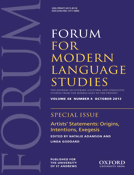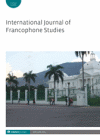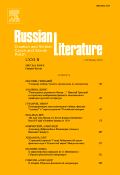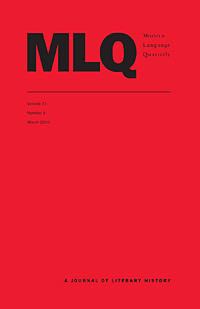
FORUM FOR MODERN LANGUAGE STUDIES
Scope & Guideline
Connecting Scholars through Language and Literary Exploration
Introduction
Aims and Scopes
- Interdisciplinary Literary Analysis:
The journal emphasizes the intersection of literature with various disciplines, including history, philosophy, and cultural studies, facilitating comprehensive explorations of texts. - Focus on Modern and Contemporary Works:
There is a strong emphasis on modern and contemporary literature, allowing for discussions around current societal issues, identity, and cultural representation. - Exploration of Multilingualism and Translation:
The journal frequently addresses themes of code-switching, translation, and multilingual narratives, reflecting the complexities of communication in a globalized world. - Critical Engagement with Historical Contexts:
Historical analyses, including the examination of literary movements and their socio-political contexts, are a core focus, providing depth to the understanding of literary works. - Cultural Critique and Social Commentary:
The journal often engages in cultural critique, addressing themes related to race, gender, and postcolonial studies, thereby promoting critical discourse on contemporary issues.
Trending and Emerging
- Decolonization and Postcolonial Studies:
An increasing number of publications focus on decolonization, exploring the impacts of colonial histories on contemporary identities and narratives. - Intersectionality in Literature:
Emerging themes examine intersectionality, particularly how race, gender, and sexuality intersect in literary works, reflecting a more nuanced understanding of identity. - Environmental Humanities:
There is a growing trend towards exploring the relationship between literature and environmental issues, indicative of a broader cultural shift towards sustainability and ecological awareness. - Digital Narratives and New Media:
The exploration of digital narratives and the role of new media in storytelling is becoming a prominent theme, highlighting the evolution of literature in the digital age. - Activism and Literature:
Recent publications increasingly focus on the role of literature in activism, particularly in relation to anti-racism, feminism, and social justice, showcasing literature as a tool for societal change.
Declining or Waning
- Traditional Literary Canon:
There is a noticeable decline in articles centered on the traditional literary canon, as the journal increasingly prioritizes diverse voices and contemporary narratives. - Focus on Classical Literature:
Themes related to classical literature, such as in-depth studies of ancient texts and their historical contexts, have diminished, indicating a shift toward modern and contemporary works. - Eurocentric Perspectives:
The journal has moved away from predominantly Eurocentric perspectives, reflecting a broader commitment to global literatures and transnational studies. - Static Theoretical Frameworks:
There is a waning interest in static or traditional theoretical frameworks, as scholars seek more dynamic and inclusive methodologies that address contemporary complexities. - Narrow Linguistic Studies:
The focus on narrow linguistic studies, such as grammar or syntax in isolation, appears to be decreasing in favor of broader discussions that incorporate sociolinguistic and cultural contexts.
Similar Journals

GERMANISCH-ROMANISCHE MONATSSCHRIFT
Cultivating Insights in Germanic and Romance StudiesGERMANISCH-ROMANISCHE MONATSSCHRIFT, published by UNIVERSITATSVERLAG C WINTER HEIDELBERG GMBH, is a vital academic journal dedicated to the fields of linguistics, literature, and literary theory. With its ISSN 0016-8904, this journal fosters scholarly discussions and disseminates innovative research that intersects Germanic and Romance languages and literatures. While it does not currently offer Open Access options, its contributions have positioned it within the Q4 quartile in both Linguistics and Language, and Literature and Literary Theory according to the 2023 category rankings. The journal's Scopus ranking reflects its emerging place within the academic community, situated at the 40th percentile for Literature and Literary Theory, and the 20th and 18th percentiles within Language and Linguistics, respectively. Scholars and students are encouraged to engage with this resource as it offers a platform for new perspectives that are pivotal to understanding the complex interrelations of these linguistic traditions, enriching both teaching and research initiatives.

ANALES DE LA LITERATURA ESPANOLA CONTEMPORANEA
Engaging Minds with the Pulse of Modern LiteratureANALES DE LA LITERATURA ESPANOLA CONTEMPORANEA is a distinguished journal published by the TEMPLE UNIVERSITY, DEPARTMENT OF SPANISH & PORTUGUESE, specializing in contemporary Spanish literature. With an ISSN of 0272-1635, this journal has carved its niche within the field, offering a platform for innovative research and discourse from 2002 to 2012 and resuming its publication from 2017 to 2024. Although it currently holds a Q4 category ranking in Literature and Literary Theory, this journal is committed to promoting high-quality scholarship, making valuable contributions to the understanding of modern literary trends and theories. Despite limited open-access options, the journal prides itself on its rigorous editorial standards and aims to engage researchers, students, and literary professionals in meaningful discussions surrounding contemporary Spanish literature. Its *Scopus ranking*, positioned at #739 out of 1106 in the Arts and Humanities category, highlights its relevance and emerging recognition within the academic community.

Criticon
Advancing interdisciplinary dialogue in History and Literature.Criticon is a distinguished open-access journal published by PRESSES UNIV MIDI-PUM in France, dedicated to advancing scholarship in the fields of History and Literature and Literary Theory. Since its transition to open access in 2014, Criticon has fostered a vibrant academic community, enabling the dissemination of high-quality research that contributes significantly to contemporary discourse. Positioned within the Q4 categories for both History and Literature, the journal boasts impressive rankings, including #152 out of 1106 in Literature and Literary Theory, reflecting its growing influence with a remarkable 86th percentile standing. With a dedication to interdisciplinary scholarship, Criticon invites researchers, practitioners, and students to submit original articles that explore the intersections of literary and historical narratives, thereby enriching the understanding of cultural and intellectual history. Located at 5 ALLEES ANTONIO MACHADO, F-31058 TOULOUSE, FRANCE, this journal not only serves as a platform for new voices but also as a beacon for established scholarship in the humanities.

INTERNATIONAL JOURNAL OF FRANCOPHONE STUDIES
Illuminating the Global Impact of Francophone VoicesThe INTERNATIONAL JOURNAL OF FRANCOPHONE STUDIES, published by INTELLECT LTD, serves as a significant platform for exploring the multifaceted dimensions of Francophone culture and its impact across various disciplines. With an ISSN of 1368-2679 and E-ISSN 1758-9142, this journal supports a diverse scholarly discourse in areas such as Cultural Studies, Gender Studies, History, Linguistics, Literature, and Sociology, among others. As of 2023, it is categorized in Q4 for multiple fields and Q3 for Literature and Literary Theory, underscoring its evolving academic presence. Researchers, professionals, and students can benefit from its rich repository of critical analyses and innovative perspectives that foster an understanding of the Francophone world from a global viewpoint. Although it does not offer open access options, its rigorous peer-review process ensures high-quality contributions that are essential for anyone engaged in Francophone studies. Situated in the United Kingdom, the journal has forged an academic legacy since its inception and continues to be a vital resource for those studying the intersections of language, culture, and identity.

RUSSIAN LITERATURE
Exploring the Depths of Russian Literary HeritageRUSSIAN LITERATURE is a premier academic journal published by ELSEVIER, dedicated to advancing the study of Russian literary traditions, critical theory, and cultural contexts. With an ISSN of 0304-3479 and an E-ISSN of 1878-3678, this journal has firmly established itself as a vital resource in the field, achieving a commendable Q1 ranking in Literature and Literary Theory as of 2023. The journal benefits from a strong impact factor and ranks #178 out of 1106 in the Scopus database, placing it in the 83rd percentile of arts and humanities research. RUSSIAN LITERATURE covers an extensive timeline, converging years from 1971 to 1974 and from 1976 to 2023, reflecting its rich academic lineage. Although not an open-access publication, the journal remains influential among scholars, professionals, and students seeking in-depth analyses and critical insights into Russian literature and literary theory. Its commitment to scholarly rigor makes it an essential read for anyone engaging with the complexities of literary studies.

MODERN LANGUAGE QUARTERLY
Cultivating a Vibrant Forum for Innovative Research.MODERN LANGUAGE QUARTERLY, published by DUKE UNIVERSITY PRESS, stands as a premier journal in the field of Literature and Literary Theory, recognized for its intellectual rigor and scholarly contributions. With an impressive Scopus ranking of #156 out of 1106 in its category, the journal showcases an 85th percentile standing, indicating its significant impact within the academic community. The journal, with ISSN 0026-7929, focuses on critical analysis, literary theory, and the intersection of language and culture, making it an essential resource for researchers, professionals, and graduate students alike. As it converges from 1996 to 2024, MODERN LANGUAGE QUARTERLY continues to uphold its tradition of excellence in literary scholarship, contributing to the advancement of knowledge and fostering a deeper understanding of literature's role in society. With its Q1 ranking in 2023, this journal represents the forefront of literary studies, providing a vibrant forum for the exchange of ideas and innovative research in the humanities.

Romanica Olomucensia
Innovating Perspectives in Linguistics and Literary TheoryRomanica Olomucensia is a distinguished open-access academic journal published by Palacky University, Department of Romance Philosophical Faculty in the Czech Republic. With its commitment to fostering advanced research in the fields of Literature and Literary Theory as well as Linguistics and Language, this journal aims to provide a platform for scholars, researchers, and students to share their findings and insights. Since its inception, Romanica Olomucensia has consistently been recognized for its quality, securing a position in the Q2 category in the literature domain and achieving a Q3 ranking in linguistics per the 2023 category quartiles. The journal is indexed in Scopus, reflecting its standing in the academic community, with impressive ranks in various arts and humanities disciplines. It has been an open-access journal since 2018, promoting unrestricted access to all its publications, thus enhancing global academic outreach. With a focus on innovation and interdisciplinary studies, Romanica Olomucensia serves as an essential resource for anyone interested in the dynamic interplay of language and literature.

Ben Jonson Journal
Connecting Past and Present through Jonson's Literary LensBen Jonson Journal, published by Edinburgh University Press, is a distinguished academic periodical dedicated to the examination of the works and contributions of the esteemed playwright and poet, Ben Jonson. Since its inception in 1996, this journal has served as a vital platform for interdisciplinary research in the fields of literature and literary theory, fostering a deeper understanding of Jonson’s impact on the literary canon and cultural discourse. With an ISSN of 1079-3453 and an E-ISSN of 1755-165X, the journal occupies a notable position in the academic landscape, currently ranked in the Q4 category of the Scopus Arts and Humanities Literature and Literary Theory metrics and holding a percentile rank of 77th. Although it does not offer open access, the journal is committed to embracing rigorous scholarly standards and advancing critical dialogue among researchers, professionals, and students alike. Its geographical roots in the United Kingdom only amplify its relevance in the global literary community, making the Ben Jonson Journal an essential resource for those seeking to explore the complexities of early modern literature.

Cadernos de Letras da UFF
Innovating Literary Studies with Open Access ScholarshipCadernos de Letras da UFF is a prominent academic journal published by the Department of History at the Federal University of Fluminense in Brazil. Since its transition to Open Access in 2014, it has fostered a spirit of collaboration and dissemination in the field of Literature and Linguistics, welcoming contributions that explore various aspects of literary studies, historical literature contexts, and linguistic phenomena. With a commitment to quality and academic rigor, the journal serves as a vital resource for scholars, practitioners, and students engaged in the humanities. The journal is dedicated to the advancement of knowledge through innovative research and critical analyses, making it an essential platform for sharing ideas with a global audience. The journal is based in Niterói, RJ, Brazil, and is indexed in various academic databases, enhancing its visibility and impact within the scholarly community.

Listy Filologicke
Unveiling Insights in History, Language, and Literary Analysis.Listy Filologicke is a distinguished academic journal published by the Institute of Classical Studies at the Academy of Sciences of the Czech Republic, focusing on the interdisciplinary fields of History, Linguistics and Language, and Literature and Literary Theory. With an ISSN of 0024-4457 and an E-ISSN of 2570-9410, this journal has been a pivotal platform for scholarly discourse since its convergence years began in 2003. Notably, it holds a Q3 classification in History and Linguistics and Language, and a Q2 in Literature and Literary Theory as of 2023. Its rankings within Scopus illustrate its relevance and impact in academia, with noteworthy positions in the Arts and Humanities and Social Sciences categories. Researchers, professionals, and students will find Listy Filologicke an invaluable resource for exploring cutting-edge research, critical analyses, and discourse that contribute significantly to their respective fields. Based in the heart of the Czech Republic, it continues to promote scholarly excellence and foster international collaboration.